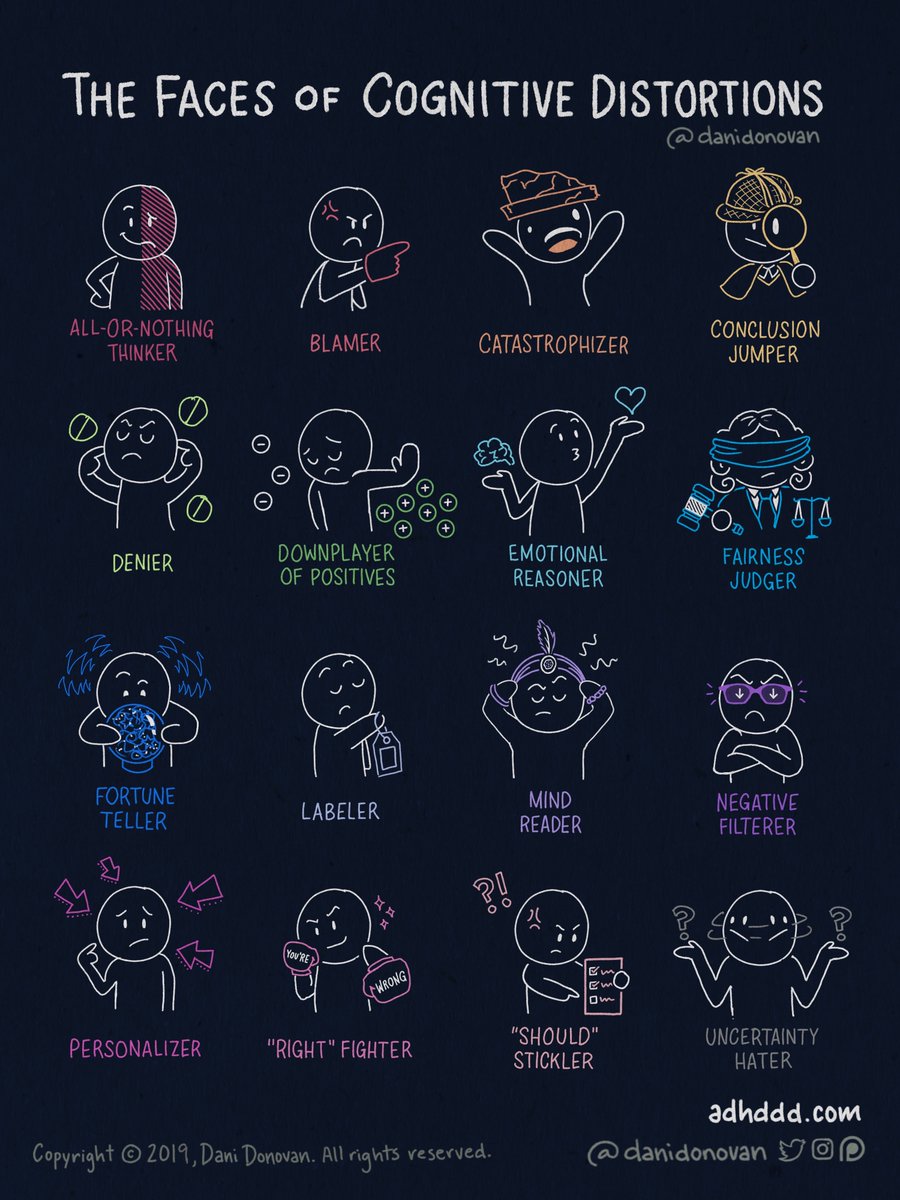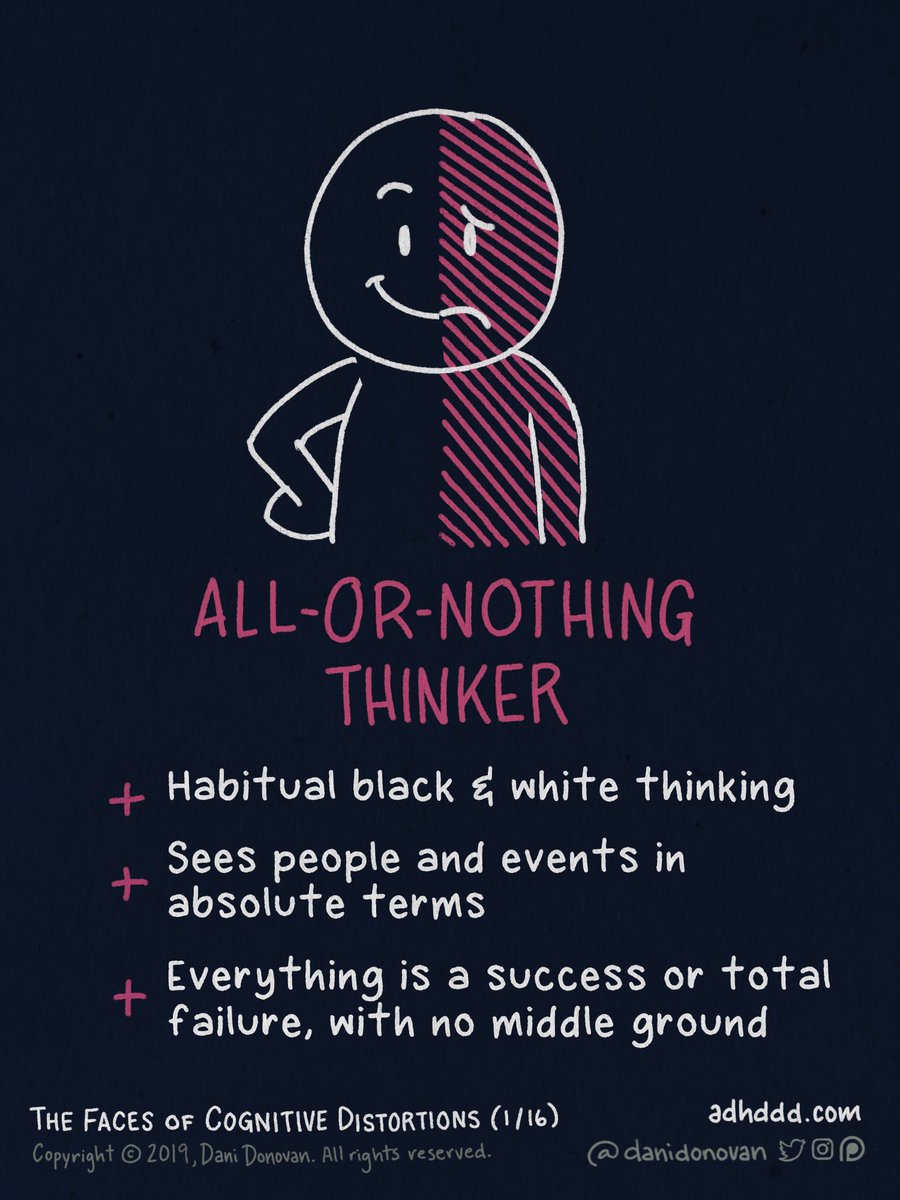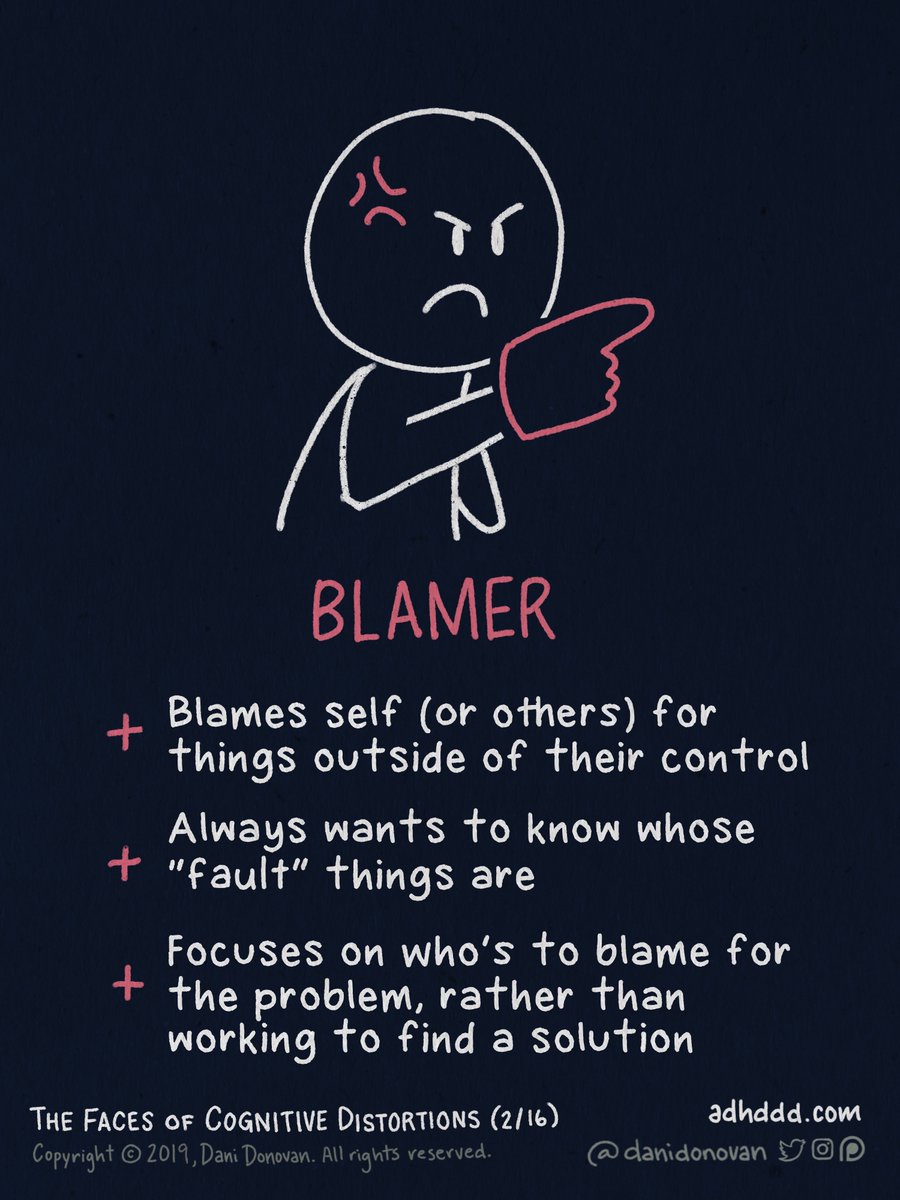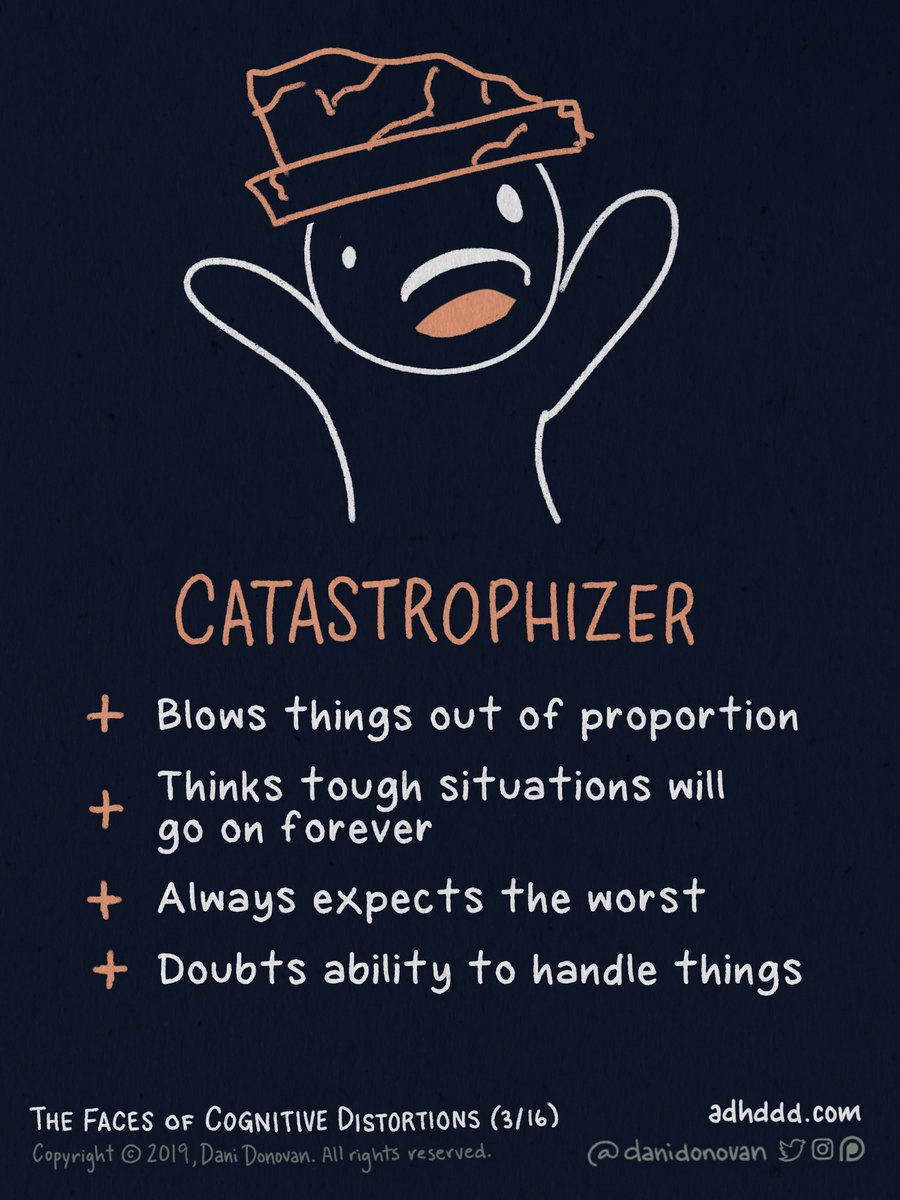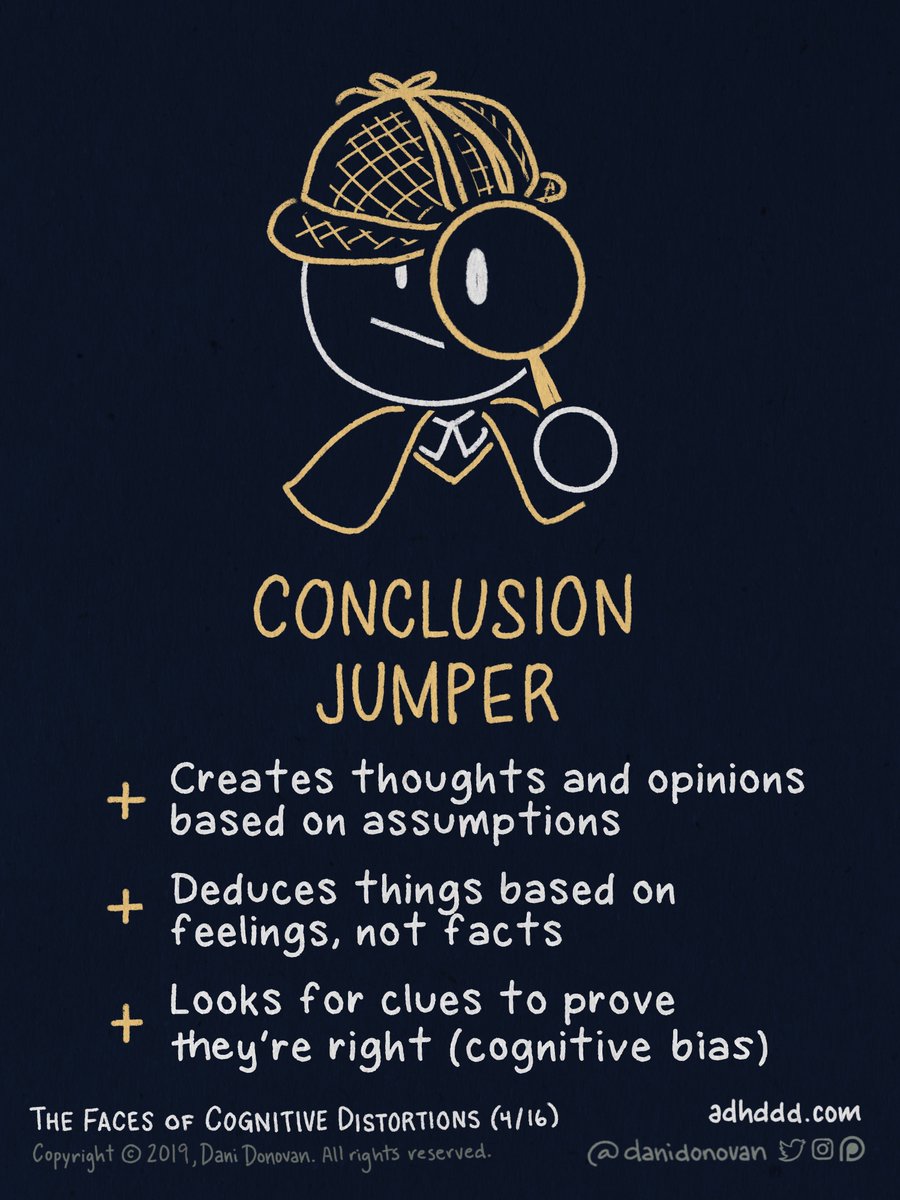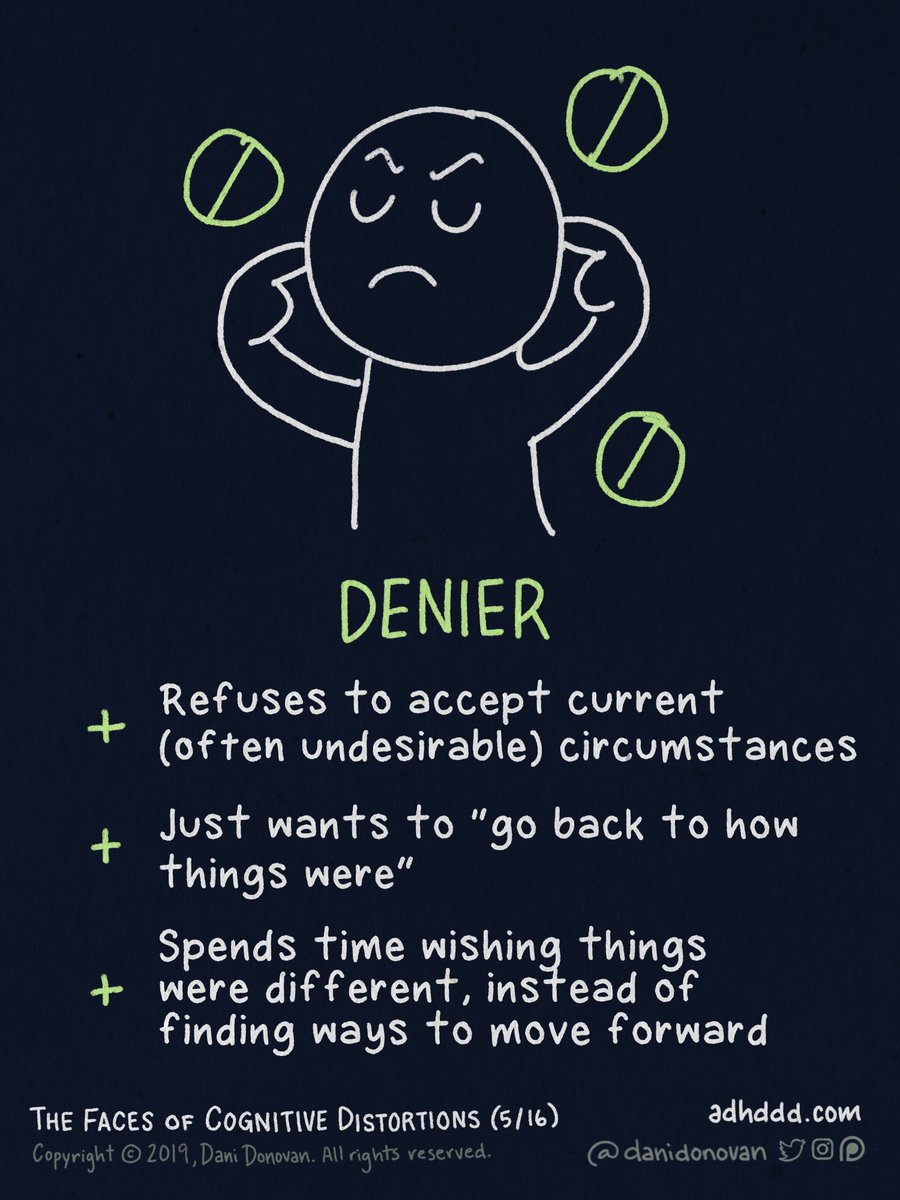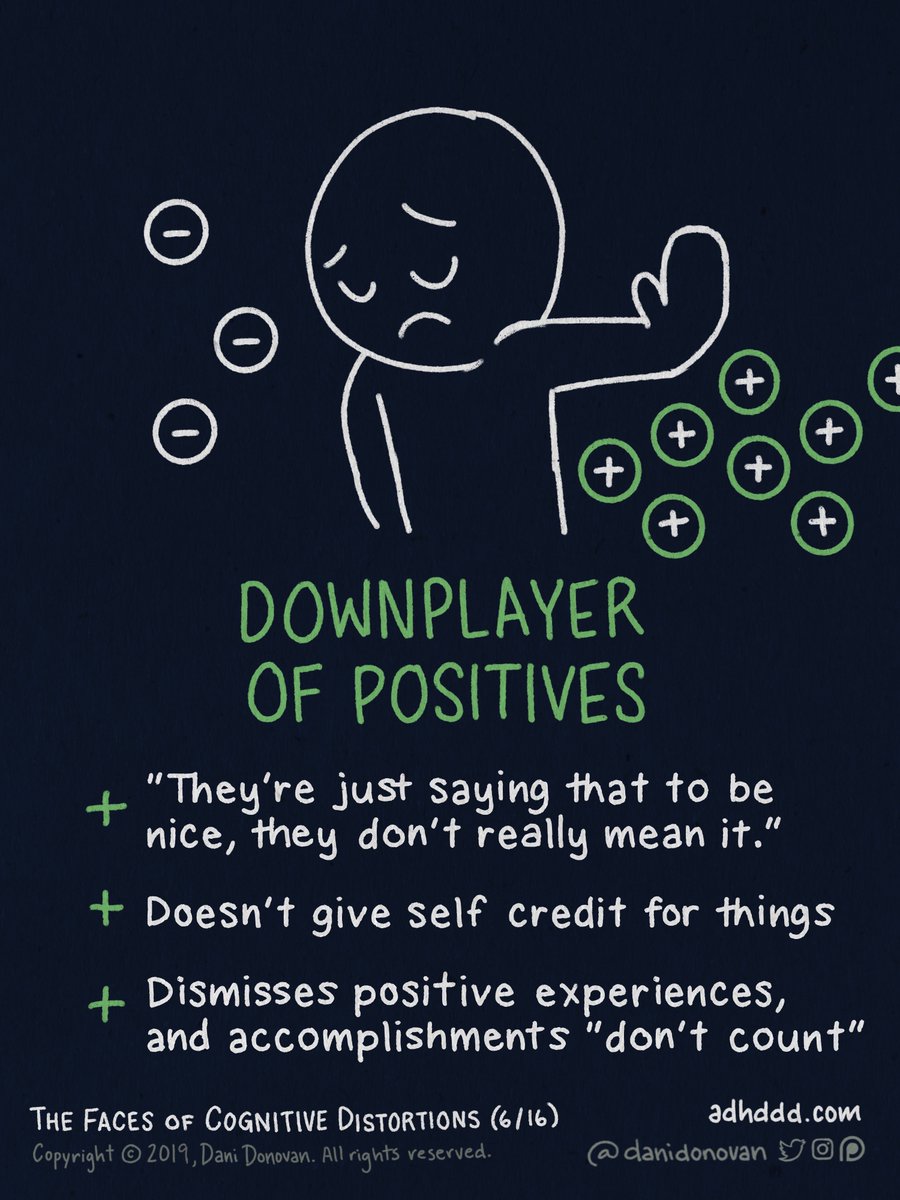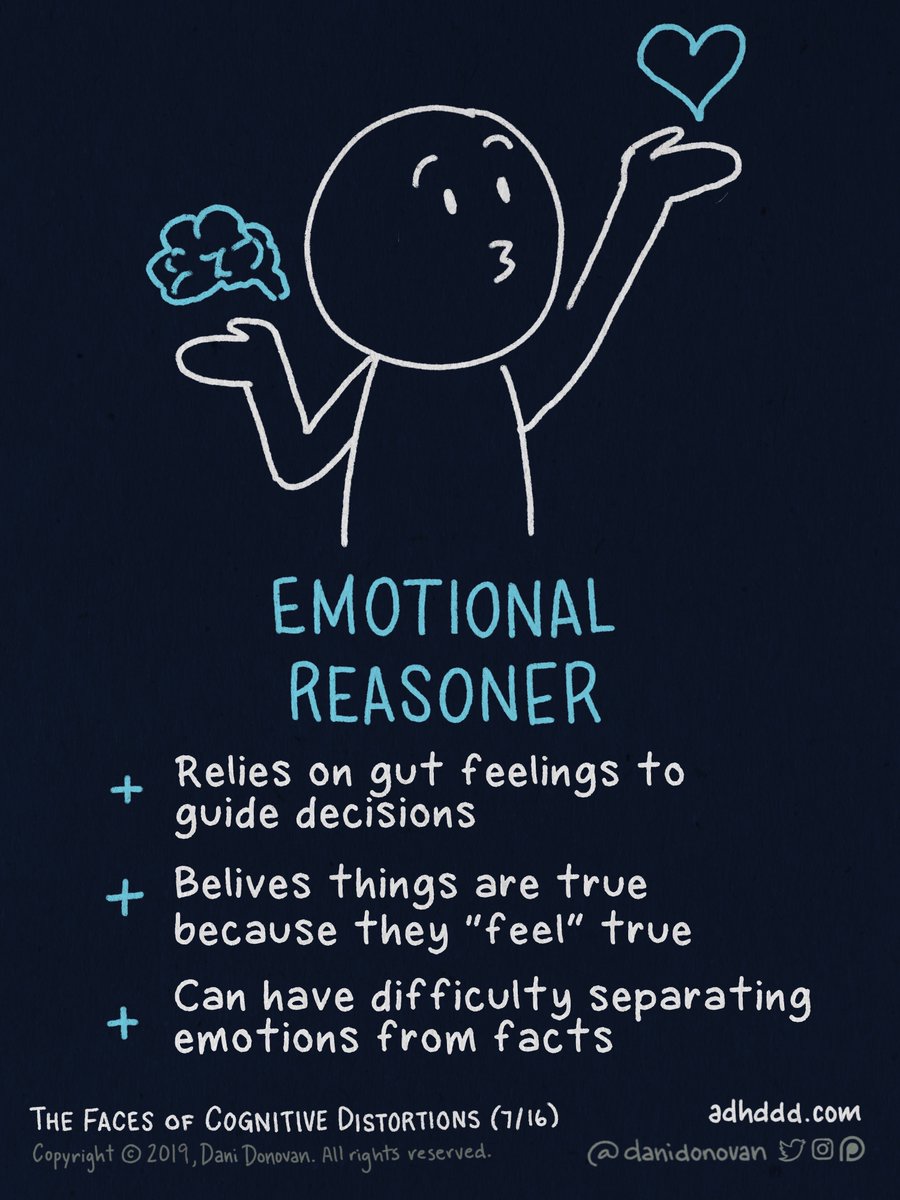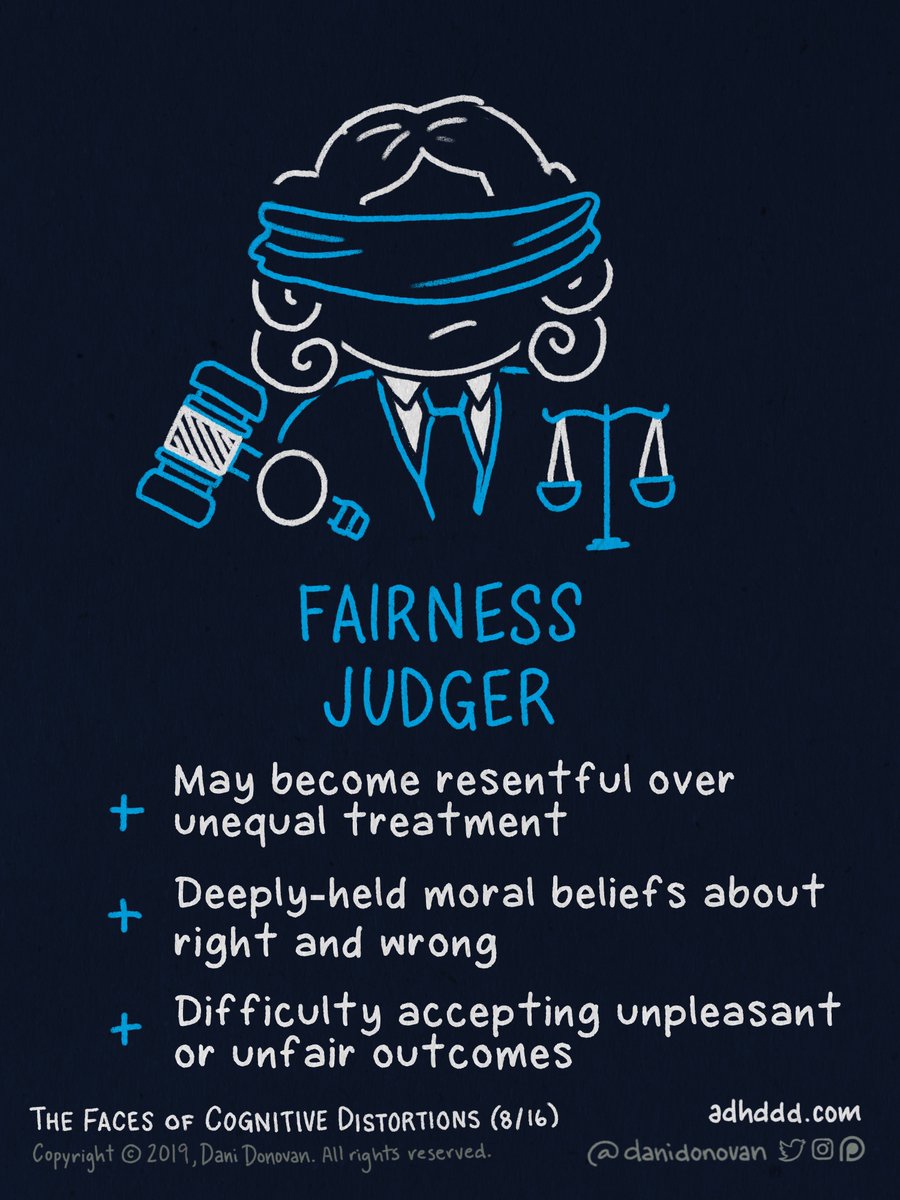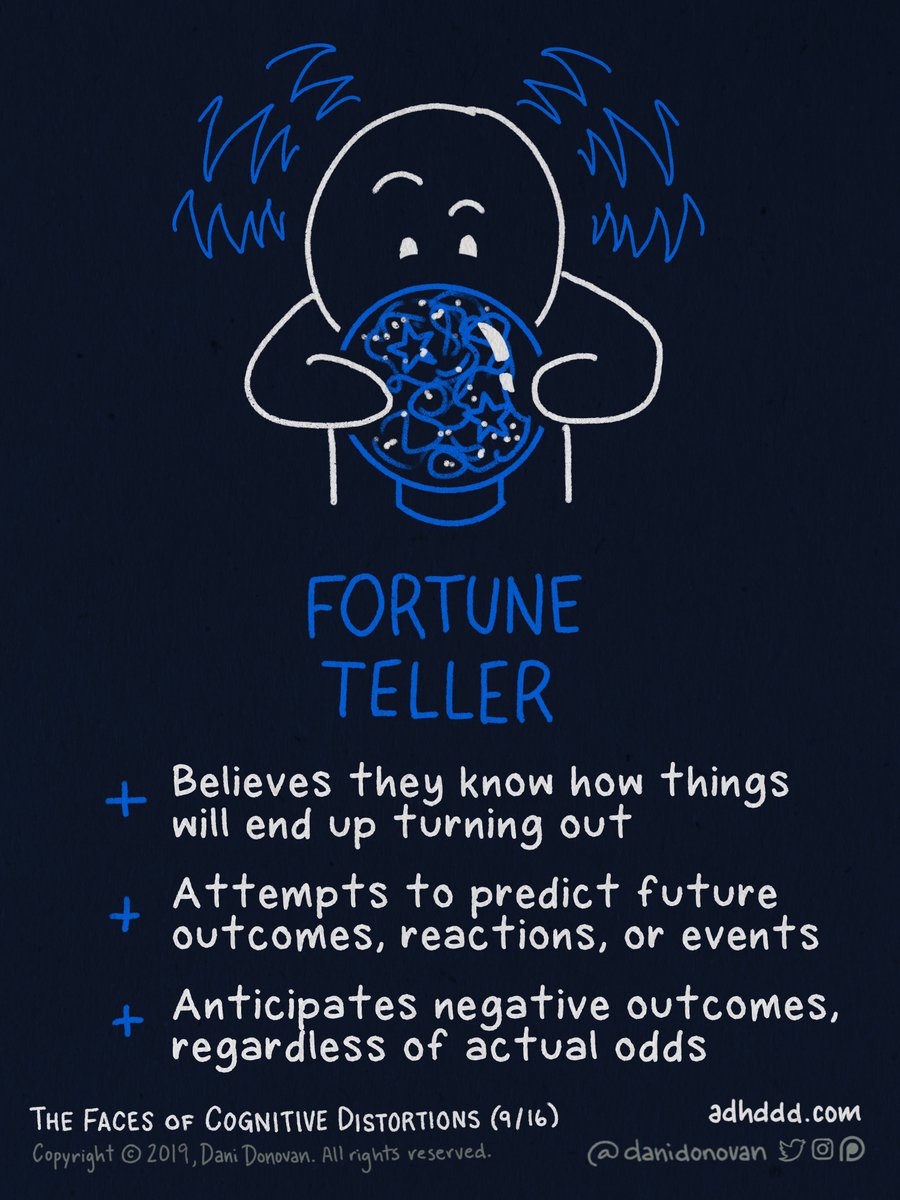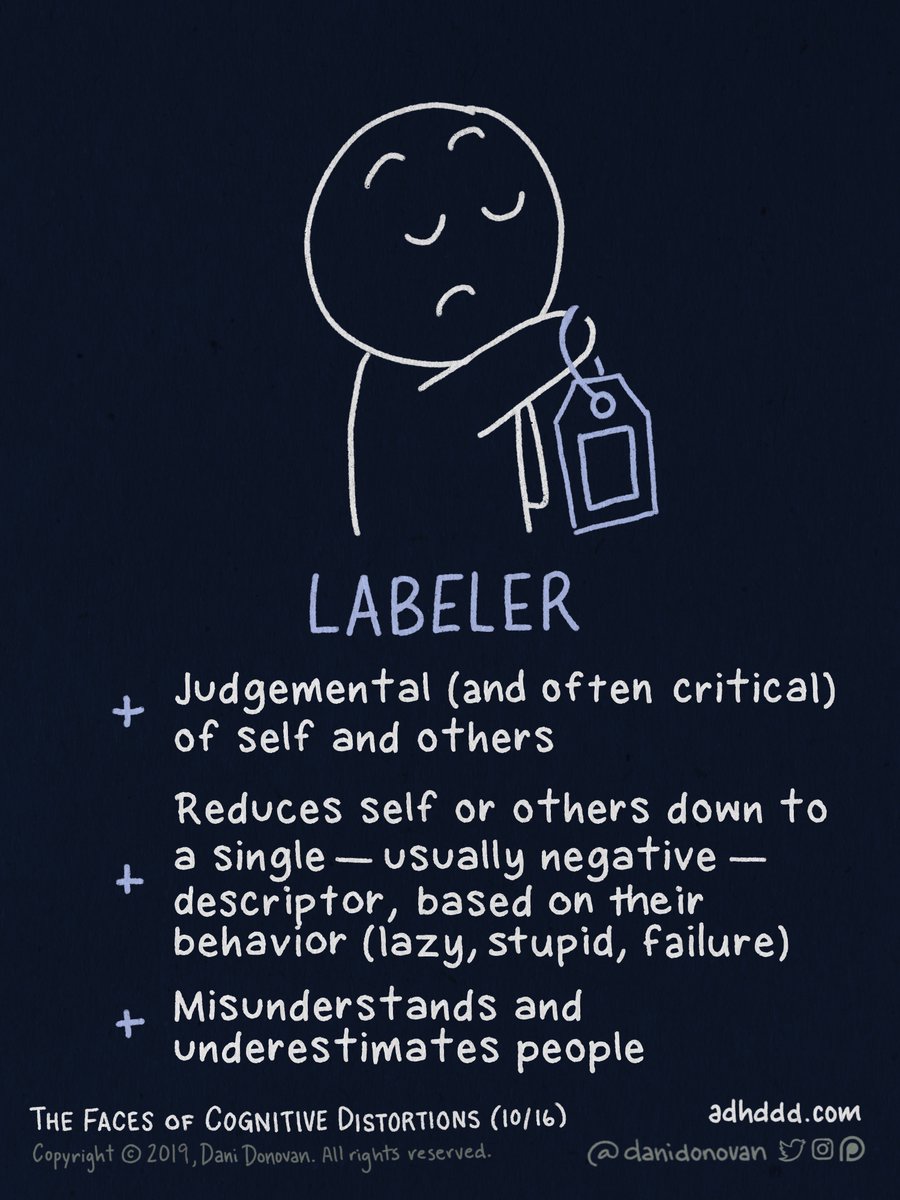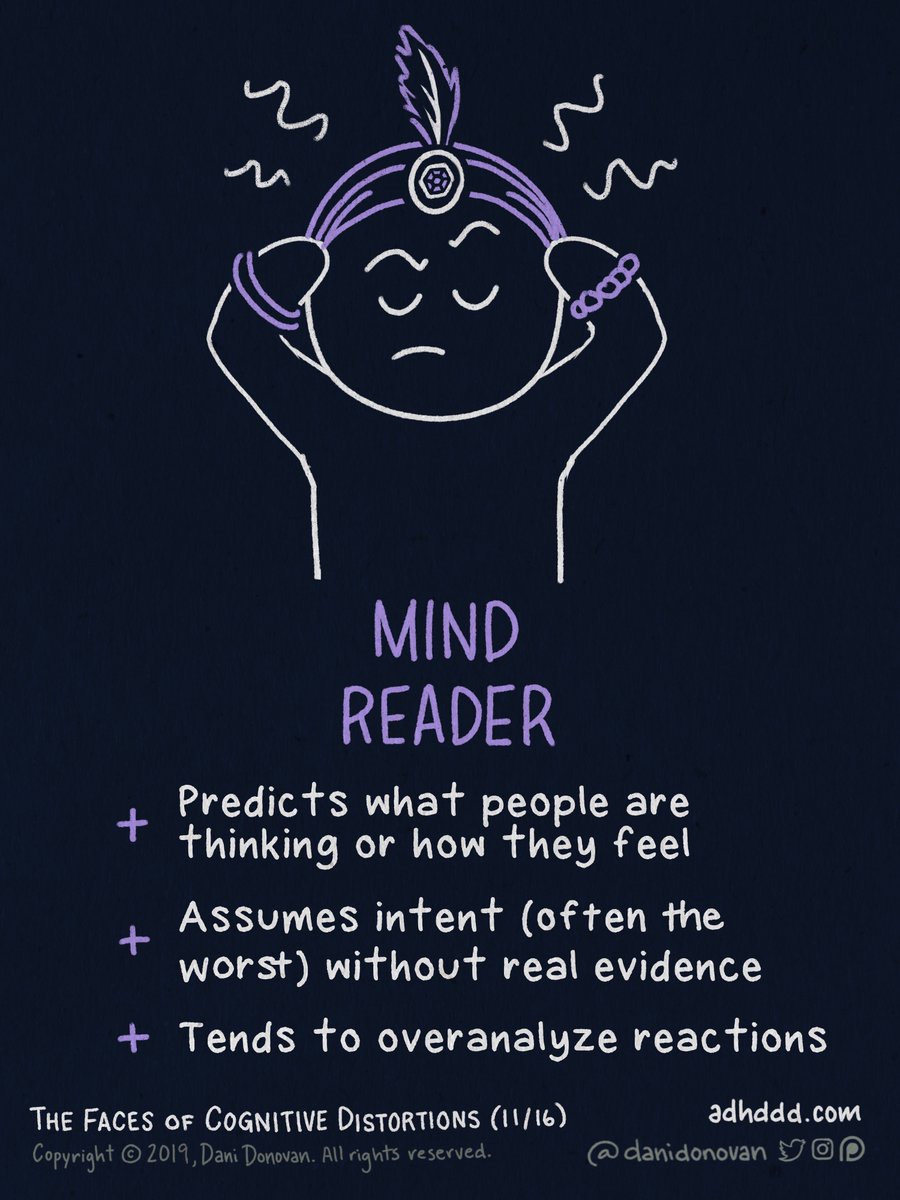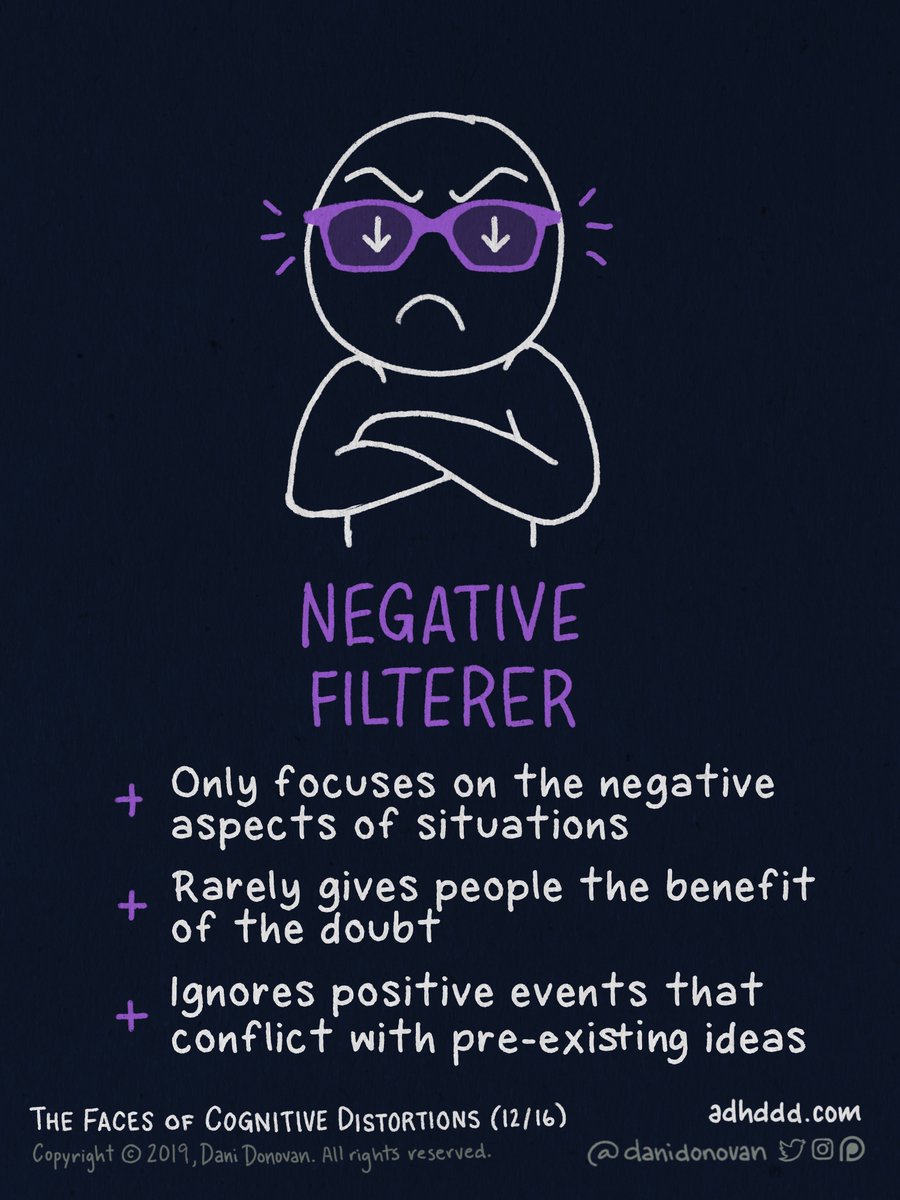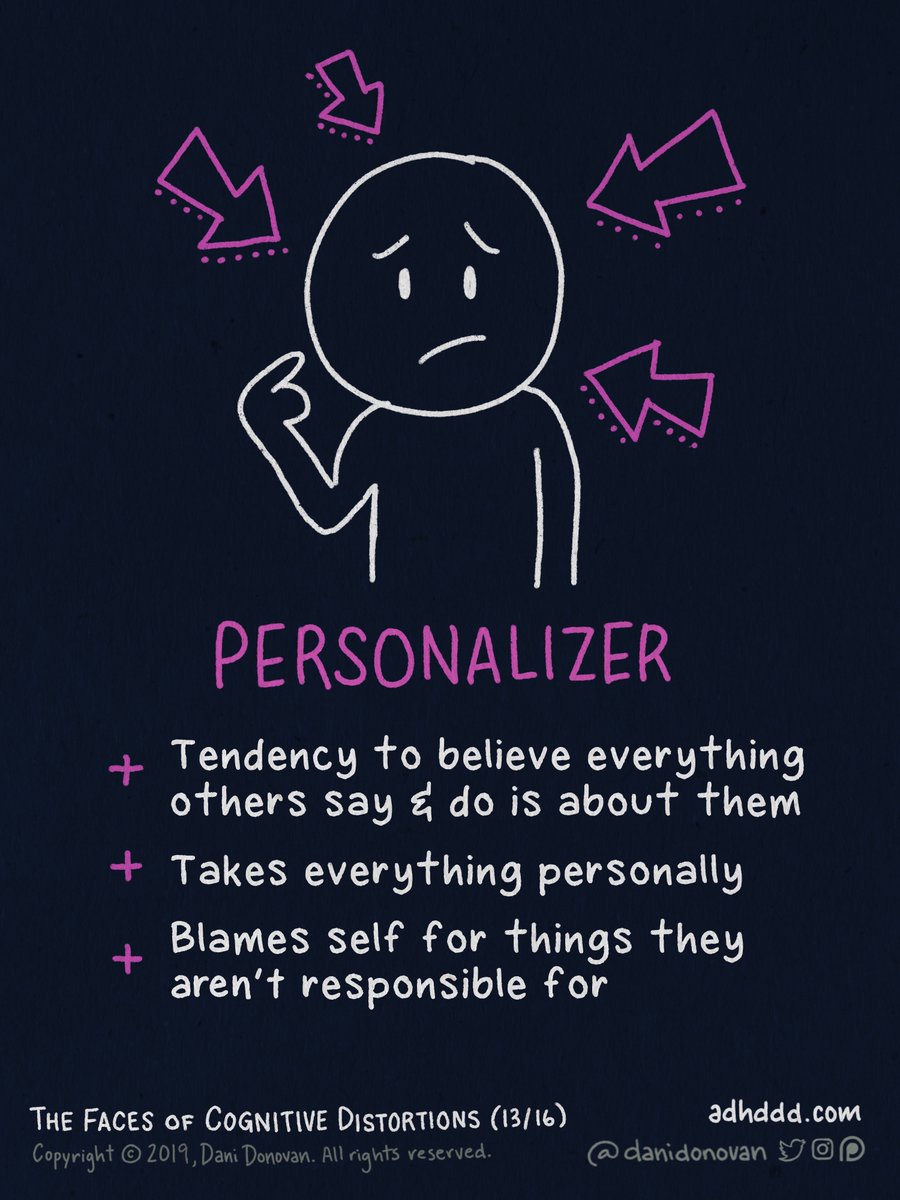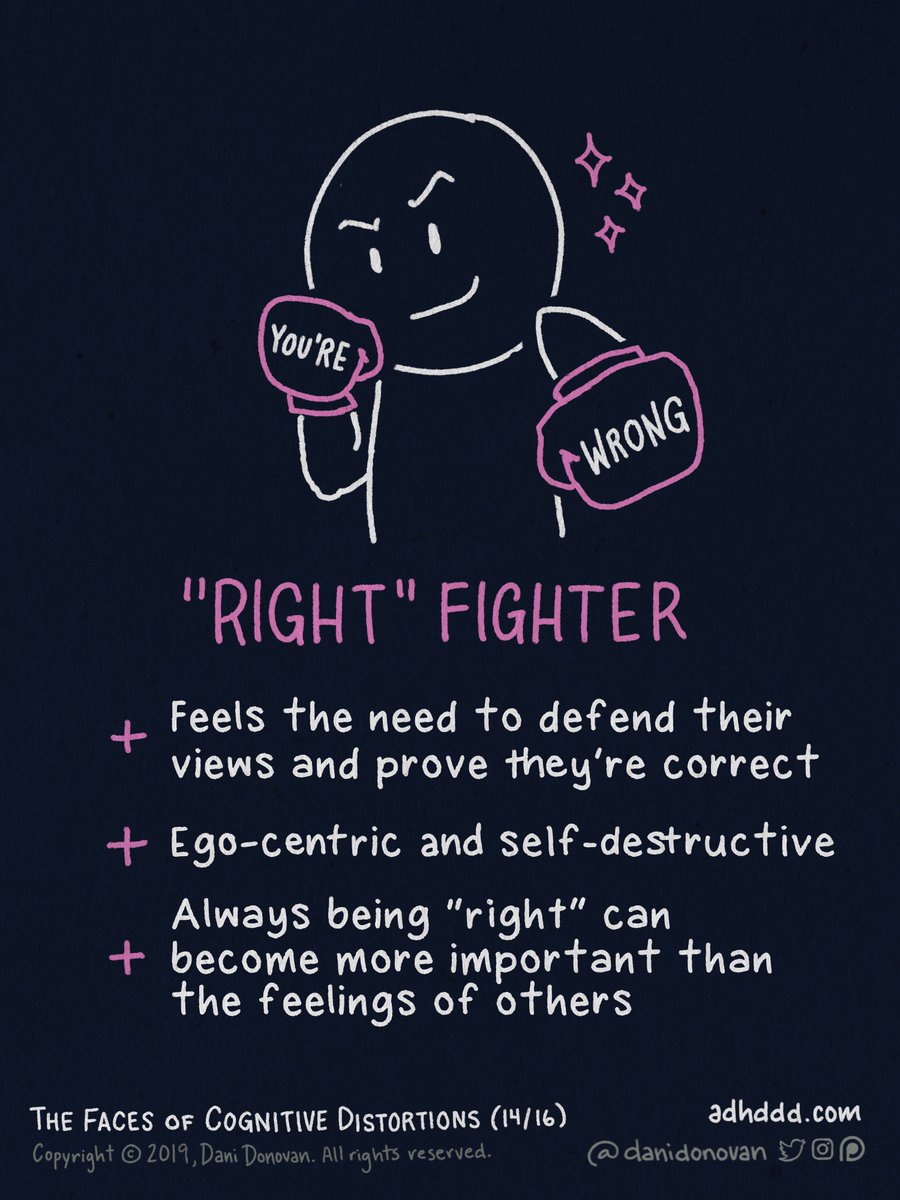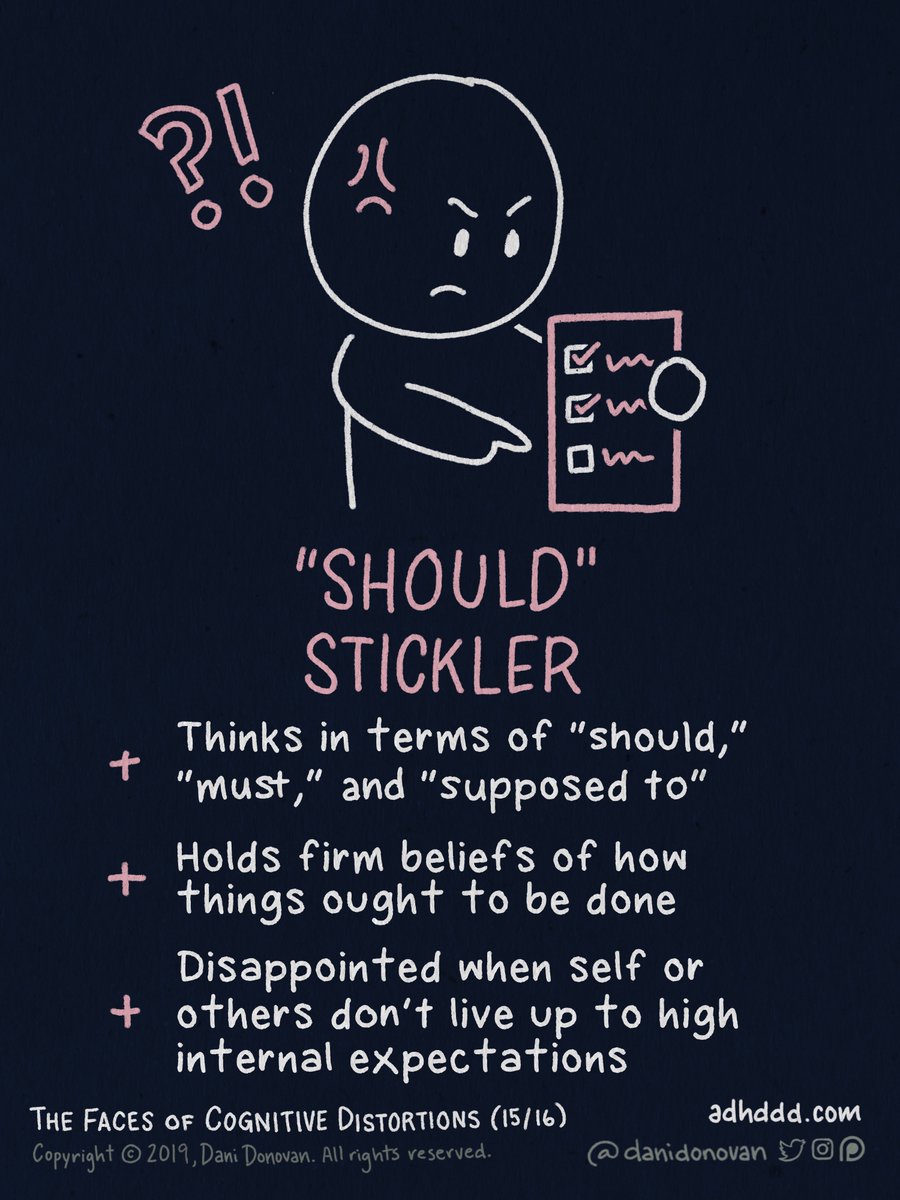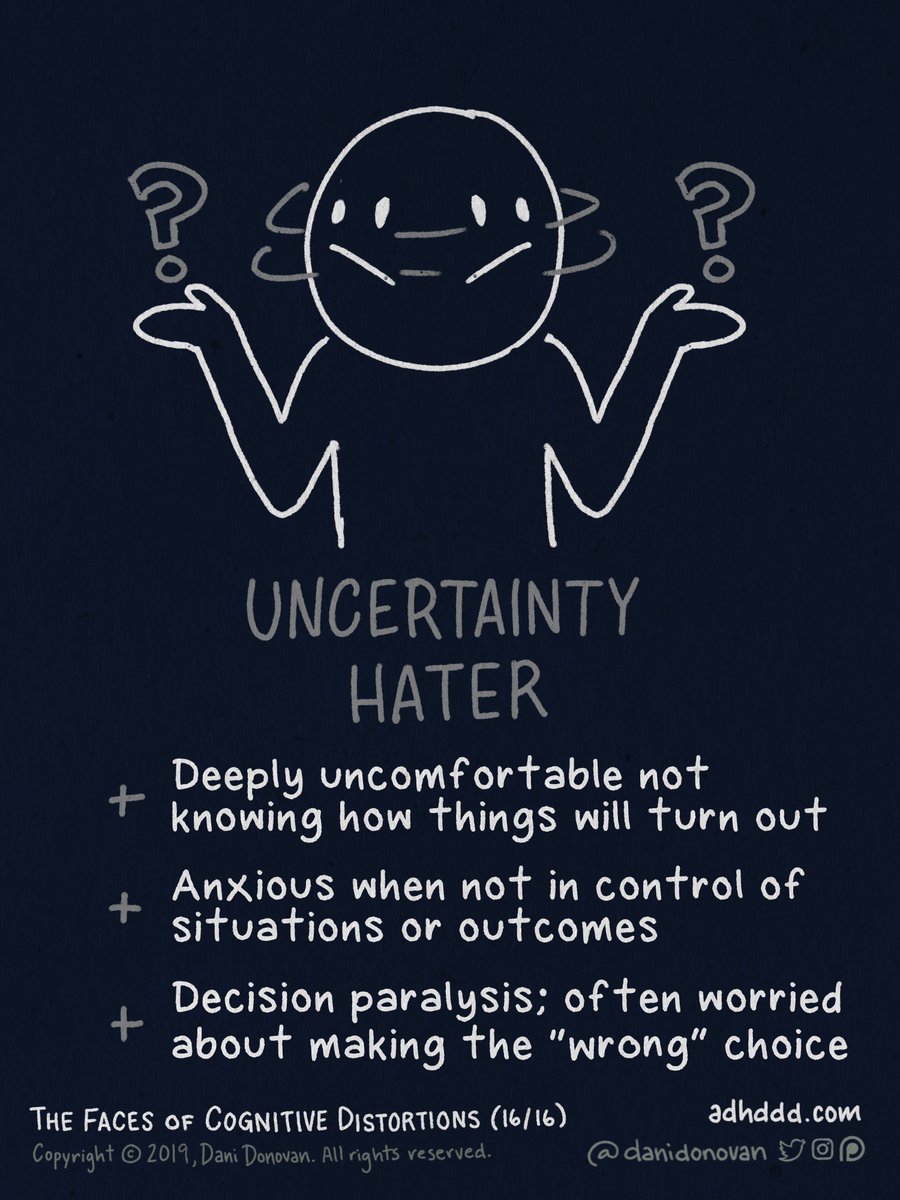Emotional regulation is HARD when your mind distorts reality.
This new & #39;Faces& #39; series is based on common distortions from Cognitive Behavioral Therapy (CBT) that reinforce irrational storylines + contribute to anxiety/depression.
Individual write-ups below (with more detail)!
This new & #39;Faces& #39; series is based on common distortions from Cognitive Behavioral Therapy (CBT) that reinforce irrational storylines + contribute to anxiety/depression.
Individual write-ups below (with more detail)!
ALL-OR-NOTHING THINKING:
+ Habitual black & white thinking
+ Sees people and events in absolute terms
+ Everything is a success or total failure
+ No middle ground
"Faces of Cognitive Distortions" (1/16)
+ Habitual black & white thinking
+ Sees people and events in absolute terms
+ Everything is a success or total failure
+ No middle ground
"Faces of Cognitive Distortions" (1/16)
BLAMING:
+ Blames self (or others) for things outside their control
+ Always wants to know whose “fault” things are
+ Focuses on who’s to blame for the problem, rather than working to find a solution
"Faces of Cognitive Distortions" (2/16)
+ Blames self (or others) for things outside their control
+ Always wants to know whose “fault” things are
+ Focuses on who’s to blame for the problem, rather than working to find a solution
"Faces of Cognitive Distortions" (2/16)
CATASTROPHIZING:
+ Blows things out of proportion
+ Thinks tough situations will never end
+ Always expects the worst
+ Doubts ability to handle things
"Faces of Cognitive Distortions" (3/16)
+ Blows things out of proportion
+ Thinks tough situations will never end
+ Always expects the worst
+ Doubts ability to handle things
"Faces of Cognitive Distortions" (3/16)
JUMPING TO CONCLUSIONS:
+ Creates thoughts and opinions based on assumptions
+ Deduces things based on feelings, not facts
+ Looks for clues to prove they’re right (cognitive bias)
"Faces of Cognitive Distortions" (4/16)
+ Creates thoughts and opinions based on assumptions
+ Deduces things based on feelings, not facts
+ Looks for clues to prove they’re right (cognitive bias)
"Faces of Cognitive Distortions" (4/16)
DENYING:
+ Refuses to accept current (often undesirable) circumstances
+ Just wants to “go back to how things were”
+ Spends time wishing things were different, instead of finding ways to move forward
"Faces of Cognitive Distortions" (5/16)
+ Refuses to accept current (often undesirable) circumstances
+ Just wants to “go back to how things were”
+ Spends time wishing things were different, instead of finding ways to move forward
"Faces of Cognitive Distortions" (5/16)
DOWNPLAYING POSITIVES:
+ “They’re just saying that to be nice, they don’t really mean it.”
+ Doesn’t give self credit for things
+ Dismisses positive experiences
+ Accomplishments “don’t count”
"Faces of Cognitive Distortions" (6/16)
+ “They’re just saying that to be nice, they don’t really mean it.”
+ Doesn’t give self credit for things
+ Dismisses positive experiences
+ Accomplishments “don’t count”
"Faces of Cognitive Distortions" (6/16)
EMOTIONAL REASONING:
+ Relies on gut feelings to guide decisions
+ Believes things are true because they “feel” true
+ Can have difficulty separating emotions from facts
"Faces of Cognitive Distortions" (7/16)
+ Relies on gut feelings to guide decisions
+ Believes things are true because they “feel” true
+ Can have difficulty separating emotions from facts
"Faces of Cognitive Distortions" (7/16)
JUDGING FAIRNESS:
+ May become resentful over unequal treatment
+ Deeply-held moral beliefs about right and wrong
+ Difficulty accepting unpleasant or unfair outcomes
"Faces of Cognitive Distortions" (8/16)
+ May become resentful over unequal treatment
+ Deeply-held moral beliefs about right and wrong
+ Difficulty accepting unpleasant or unfair outcomes
"Faces of Cognitive Distortions" (8/16)
FORTUNE-TELLING:
+ Believes they know how things will end up turning out
+ Attempts to predict future outcomes, reactions, or events
+ Anticipates negative outcomes, regardless of actual odds
"Faces of Cognitive Distortions" (9/16)
+ Believes they know how things will end up turning out
+ Attempts to predict future outcomes, reactions, or events
+ Anticipates negative outcomes, regardless of actual odds
"Faces of Cognitive Distortions" (9/16)
LABELING:
+ Judgemental (and often critical) of self or others
+ Reduces self or others down to a single — usually negative — descriptor, based on their behavior (lazy, stupid, failure)
+ Misunderstands and underestimates people
"Faces of Cognitive Distortions" (10/16)
+ Judgemental (and often critical) of self or others
+ Reduces self or others down to a single — usually negative — descriptor, based on their behavior (lazy, stupid, failure)
+ Misunderstands and underestimates people
"Faces of Cognitive Distortions" (10/16)
MIND READING:
+ Predicts what people are thinking or how they feel
+ Assumes intent (often the worst) without real evidence
+ Tends to overanalyze reactions
"Faces of Cognitive Distortions" (11/16)
+ Predicts what people are thinking or how they feel
+ Assumes intent (often the worst) without real evidence
+ Tends to overanalyze reactions
"Faces of Cognitive Distortions" (11/16)
NEGATIVE FILTERING:
+ Only focuses on the negative aspects of situations
+ Rarely gives people the benefit of the doubt
+ Ignores positive events that conflict with pre-existing ideas
"Faces of Cognitive Distortions" (12/16)
+ Only focuses on the negative aspects of situations
+ Rarely gives people the benefit of the doubt
+ Ignores positive events that conflict with pre-existing ideas
"Faces of Cognitive Distortions" (12/16)
PERSONALIZING:
+ Tendency to believe everything others say and do is about them
+ Takes everything personally
+ Blames self for things they aren’t responsible for
"Faces of Cognitive Distortions" (13/16)
+ Tendency to believe everything others say and do is about them
+ Takes everything personally
+ Blames self for things they aren’t responsible for
"Faces of Cognitive Distortions" (13/16)
NEEDING TO BE RIGHT:
+ Feels the need to defend their views and prove they’re correct
+ Ego-centric and self-destructive
+ Always being “right” can become more important than the feelings of others
"Faces of Cognitive Distortions" (14/16)
+ Feels the need to defend their views and prove they’re correct
+ Ego-centric and self-destructive
+ Always being “right” can become more important than the feelings of others
"Faces of Cognitive Distortions" (14/16)
“SHOULD” BELIEFS:
+ Thinks in terms of “should,” “must,” and “supposed to”
+ Holds firm beliefs of how things out to be done
+ Disappointed when self or others don’t live up to high internal expectations
"Faces of Cognitive Distortions" (15/16)
+ Thinks in terms of “should,” “must,” and “supposed to”
+ Holds firm beliefs of how things out to be done
+ Disappointed when self or others don’t live up to high internal expectations
"Faces of Cognitive Distortions" (15/16)
INTOLERANCE OF UNCERTAINTY:
+ Deeply uncomfortable not knowing how things will turn out
+ Anxious when not in control of situations or outcomes
+ Decision paralysis; often worried about making the “wrong” choice
"Faces of Cognitive Distortions" (16/16)
+ Deeply uncomfortable not knowing how things will turn out
+ Anxious when not in control of situations or outcomes
+ Decision paralysis; often worried about making the “wrong” choice
"Faces of Cognitive Distortions" (16/16)
Wanna see a bunch of new #ADHD comics that I haven’t posted on social media yet?  https://abs.twimg.com/emoji/v2/... draggable="false" alt="🎨" title="Farbpalette" aria-label="Emoji: Farbpalette">
https://abs.twimg.com/emoji/v2/... draggable="false" alt="🎨" title="Farbpalette" aria-label="Emoji: Farbpalette"> https://abs.twimg.com/emoji/v2/... draggable="false" alt="😍" title="Lächelndes Gesicht mit herzförmigen Augen" aria-label="Emoji: Lächelndes Gesicht mit herzförmigen Augen">
https://abs.twimg.com/emoji/v2/... draggable="false" alt="😍" title="Lächelndes Gesicht mit herzförmigen Augen" aria-label="Emoji: Lächelndes Gesicht mit herzförmigen Augen">
They’re available weeks/months in advance on my Patreon! https://abs.twimg.com/emoji/v2/... draggable="false" alt="💖" title="Funkelndes Herz" aria-label="Emoji: Funkelndes Herz">
https://abs.twimg.com/emoji/v2/... draggable="false" alt="💖" title="Funkelndes Herz" aria-label="Emoji: Funkelndes Herz">
Join our community: http://patreon.com/danidonovan ">https://patreon.com/danidonov...
They’re available weeks/months in advance on my Patreon!
Join our community: http://patreon.com/danidonovan ">https://patreon.com/danidonov...

 Read on Twitter
Read on Twitter